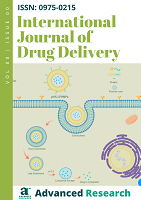A comparative study of Okra gum on controlled release kinetics and other formulation characteristics of Tramadol HCl extended release matrix tablets Vs Synthetic hydrophilic polymers.
Keywords:
Tramadol HCl, HPMC E15LV, HPMC K4M, HPMC K100M, Okra gum, Matrix tabletsAbstract
The main aim of this investigation was to develop a sustained release matrix tablets of Tramadol HCl using hydrophilic polymers such as hydroxyl propyl methyl cellulose (HPMC), in different grades (E15LV, K4M, K100M) and compare the various parameters against the natural polysaccharide Okra gum. The polymer proportions are used in different concentration in order to optimize the correct proportion of polymer to achieve controlled release profile. The matrix tablets were prepared by direct compression technique which is more industrially relevant. A small quantity of Carbopol was also incorporated in the formulation to give bio-adhesiveness & improved compression characteristics. The formulations were studied for pre-compression parameters and postcompression parameters. The in vitro drug release study was performed in 0.1N HCl (pH 1.2) for 1.5 hour and phosphate buffer (pH 6.8) were upto 12 hours. The study results revealed that the matrix tablet can be developed with the used polymers without any tablet manufacturing defects in optimized polymer concentration.. The polymers could control the drug release in various levels according to the concentration present in the formulation. The drug release profile was fitted with various pharmacokinetics models. The formulations showed the different degree of fit with different kinetic models. The drug release mechanism involves the combined process of diffusion, swelling and erosion.
References
. George M, Robinson J. Modern
Pharmaceutics. Edited by Banker GS,
Rhodes CT 1990; 2: 639-658 .
. Deighton C, Mahony R, Tosh J, Turner
C, Rudolf M and Guideline Development
Group Management of Rheumatoid
arthritis: summary of NICE guidance
; 338: 710ă712.
. Landre-Beauvais AJ (1800) La goutte
asthénique primitivee (doctoral thesis).
Paris. reproduced in Landre-Beauvais
AJ. (March 2001) The first description of
rheumatoid arthritis. Unabridged text of
the doctoral dissertation presented in
". Joint Bone spine, Volume 68,
Issue 2, Page 130ă43.
. Majithia V, Geraci S. Rheumatoid
arthritis: diagnosis and
management.2007; 120(1):
. American College of Rheumatology
Subcommittee on Rheumatoid Arthritis
Guidelines. Guidelines for the
management of rheumatoid arthritis.
; 46: 328.
. Recommendations for the prevention
and treatment of glucocorticoid-induced
osteoporosis: 2001 update. American
College of Rheumatology Ad Hoc
Committee on Glucocorticoid- Induced
Osteoporosis. 2001; 44: 1496.
. Desmeules J, Piguet V, Collart L, Dayer
P. Contribution of monoaminergic
modulation to the analgesic effect of
Tramadol.1996; 41: 7ă12.
. Preston KL, Jasinski DR, Testa M.
Abuse potential and pharmacological
comparison of Tramadol and
morphine. Drug Alcohol Depend.1991;
: 7ă17.
. Jaleh V, Naser T, Fatemeh K. Use of
hydrophilic natural gums In formulation
of sustainedrelease matrix tablets of
Tramadol HCl. 2006; 7(1): E168ăE174.
. [Sengkhamparn N, Sagis LMC, Vries D,
Schols HA, Sajjaanantakul T, Voragen
AGJ. Characterisation of cell wall
polysaccharides from okra
(Abelmoschus esculentus (L.) Moench).
Food Hydrocolloids, 2010; 24: 35ă41.
. Somboonpanyakul P, Wang Q, Cui W,
Barbut S, Jantawat P. Malva nut gum
(Part I): extraction and physicochemical
characterization.2006; 64: 247ă253.
. Sinha VR, Kumria R. Binders for colon
specific drug delivery, an in-vitro
evaluation 2002; 24: 923ă31.
. Agarwal M, Srinivasan R, Mishra A. A
study on flocculation efficiency of okra
gum in sewage waste water. 2001; 9:
-63.
. Tavakoli N, Ghasemi N, Taimouri R,
Hamishehkar H. Evaluation of okra gum
as a binder in tablet dosage forms.
; 2: 47.
. Onunkwo GC, Udeala OK. Some
physical properties of theophylline
monohydrate sustained release tablets
formulated with Abelmoschus
esculentus Gum as a hydrophilic matrix,.
; 2: 145ă152.
. Ofoefule SI, Chukwu AN, Anayakoha A,
Ebebe IM. Application of Abelmoschus
esculentus in solid dosage forms 1: use
as binder for poorly water soluble drug.
; 63: 234-238.
. Singh B, Dahiya M, Saharan V, Ahuja N.
Optimizing drug delivery systems using
Design of Experiments Part II:
Retrospect and Prospects. 2005; 22:
ă292.
. Martins E, Christiana I, Stephen B,
Joseph F, Olobayo K, Sabinus O.
Extraction and Physicochemical
Characterization of a New
Polysaccharide Obtained from the Fresh
Fruits of Abelmoschus Esculent. 2011;
(2): 237-246.
. Mohammed SA, Abdellatif AM, Shahzad
H. Effect of okra gum on the pasting,
thermal, and viscous properties of rice
and sorghum starches.2012; 1: 199ă
. Tavakoli N, Ghasemi N, Taimouri HH.
Evaluation of Okra gum as a binder in
tablet dosage forms.2004; 3(2): 47.
. Siepmann J, Kranz H, Peppas NA,
Bodmeier R. Calculation of the required
size and shape of hydroxypropyl
methylcellulose matrices to achieve
desired drug release profiles. 2001; 151
-164.
. Singh B, Pahuja S, Kapil R, Ahuja N.
Formulation development of oral
controlled release tablets of hydralazine:
optimization of drug release and
bioadhesive characteristics. 2009; 59:
ă13.
. Higuchi T. Mechanism of sustainedaction medication. Theoretical analysis
of rate of release of solid drugs
dispersed in solid matrices. 1963;
(12): 1145-1149.
. Korsemeyer RW, Gurny R, Doelker EM,
Buri P, Peppas NA. Mechanism of
olute release from porous hydrophilic
polymers. 1983; 15: 25-35.





